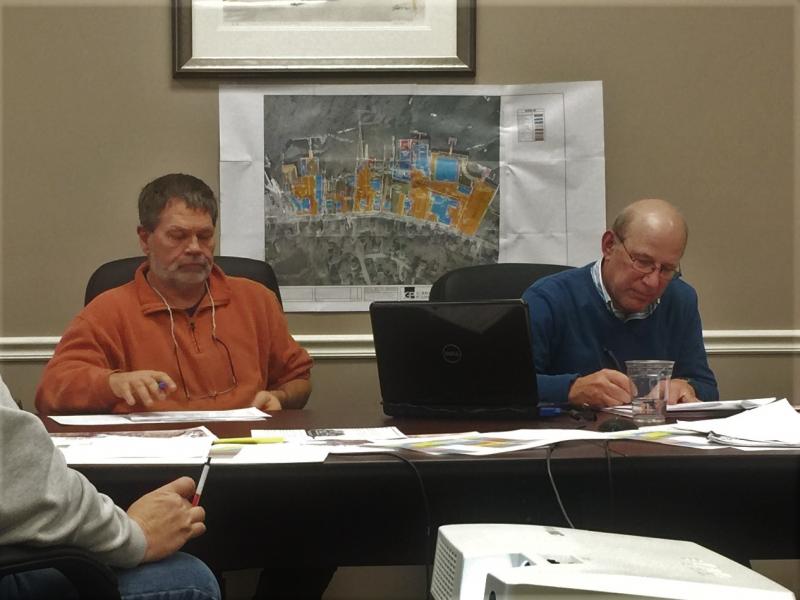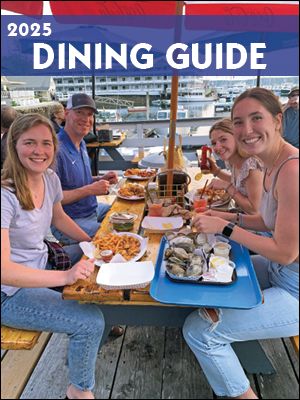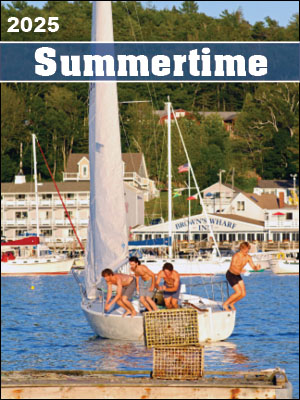East side-themed work group kicks off
The Boothbay Harbor Planning Board’s latest advisory group – sanctioned on Dec. 13 – met for the first time on Wednesday, Dec. 20. The group was created to identify how changes to the marine and water-dependent zoning on the east side of the harbor can encourage future investment in currently nonconforming businesses.
The meeting was primarily about organizing administrative guidelines and identifying goals and a process. Talking points included public access concerns, building heights, residential density, permitted uses, and the structure of new zoning.
Bill Hamblen, incoming chair of the planning board, is heading the group which is composed of Code Enforcement Officer Geoff Smith; Lincoln County Planner Bob Faunce; Dan Bacon of Gorrill Palmer; Selectman Mike Tomko; planning board member Chris Swanson; and Tim Brown and Jeanne Fuller, east side representatives.
“One of the key goals for everyone is to continue to support the working waterfront and marine-dependent uses,” said Hamblen. “It’s fairly obvious how we support the preexisting non-water-dependent uses in the district and making sure they’re permitted uses ... It’s less obvious to me how we support the existing water-dependent uses.”
This was the big question of the evening. Group members mulled over how to prop up existing and future maritime businesses without effectively encouraging those businesses to sell to developers who might turn a working dock into a harbor resort. One suggestion was making the nonconforming businesses conforming while leaving maritime businesses as they are.
Sea Pier’s Douglas Carter entered the meeting late, interjecting that that would be highly unethical because it would drastically increase the property value of any properties that are allowed to have hotels or residences and throttle the value of working properties which would be required to remain as such. Carter added, if the town is worried about the development of specific properties, it should purchase the property, but otherwise, everything should be treated equally in the zoning process.
Hamblen responded that the group is simply brainstorming ways to keep and create incentives for marine and water-dependent businesses because if those incentives cannot be made, Hamblen feared, there will be nothing to protect.
Southport resident and Boothbay Harbor business owner Tom Myette suggested the group slightly draw its focus away from zoning in order to address the issue of supporting water-dependent uses.
“The elephant in the room is, ‘What is working waterfront?’ We tried to define a policy through code … 30 years ago and now we have fishermen in the room, some ‘yes’ and some ‘no,’ saying it failed for whatever reason … The code isn’t the only way to drive policy … There’s tax policy as well. I would encourage at least to consider that you keep your zoning as simple as possible … and if you really want to drive something like a fish pier without affecting private property rights, you do that through your town tax policy.”
Hamblen asked town attorney Bill Logan whether or not this work group session appears to be sound in its discussions and goals. Hamblen said he wanted a response on record so that the group, and both the planning and select boards, are aware of any legal issues on how they are operating and intend on operating in the future.
Logan said he had not, so far, seen anything that could be considered improper. Rick Shenay of Drummond Woodsum Law, an attorney of Paul Coulombe, added, “You’re not a legislative body. You’re not enacting anything – you’re simply working on a process.”
West Harbor Pond Watershed Association President Gary Arnold mentioned that a rezoning process would be an opportunity to improve the harbor’s water quality by addressing the east side’s impermeable surfaces – that is, minimizing concrete and tar to improve water runoff into the harbor. Hamblen said this was already something on the group’s radar.
Members of the group briefly discussed the timeline on getting a warrant to the public and no one was optimistic about seeing it at the annual town meeting in May. According to the discussion, a special town meeting will likely take place in June or July.
“As things get ticked off, we can start the process and have things ready,” said Tomko. “Where there’s agreement, things can move forward and we can get things done in a timely way. If it’s going to take more time, we’re not going to shortchange the process and not give everyone the chance for enough review and comment.”
The work group meets next at 7 p.m. Thursday, Jan. 4.
Event Date
Address
United States





























